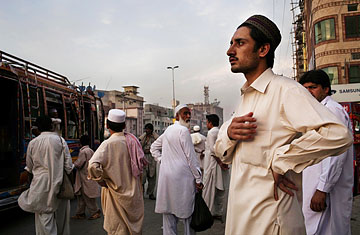
A street scene on GT Road, the route Abdullah Yusuf Azzam is believed to have travelled to his routine Friday prayer at an Arab Mosque in the University Town neighbourhood of Peshawar, in Pakistan
November 24, Peshawar, Pakistan
On the morning of Nov. 23, 1989, Waheed Muzhda, an Afghan translator working in Peshawar, Pakistan, for one of the most important Arab leaders of the anti-Soviet jihad, noticed something peculiar on his way to work. Laborers had blocked off a small intersection leading to a mosque popular with the Afghan Arabs, as the foreign jihadis were called, and were cleaning the drainage culvert of accumulated garbage. At work, Muzhda joked with his colleagues that the mayor had probably received funds for a neighborhood cleanup, but would spend only enough to prepare one corner for an official inspection.
The next day, Muzhda's boss, a charismatic Palestinian preacher called Abdullah Azzam, left his house for the Arab mosque where he was due to lead the Friday prayer. A month before, unknown men had planted a bomb under the minbar from which he usually preached. It had been spotted by a cleaner before the service, but Azzam knew there would be other attempts on his life. Still, he shrugged off the threat, telling journalist Jamal Ismail, "My destiny is already written. Nothing I can do will prevent what is meant to happen."
That November morning, Umme Mohammad, Azzam's wife, waved goodbye to her husband and two sons, Mohammad, 23, and Ibrahim, 14, as they drove to the mosque, then turned to the kitchen where she began to prepare the evening meal. A few minutes later she heard a loud explosion. A plume of black smoke filled the sky from the direction of the mosque. "I already knew," she told me recently, sitting in her living room in Amman, Jordan. But she called the office anyway. "I asked, 'Was it the mosque, or the car?' 'The car.' My husband and sons had become martyred."
The explosion was witnessed by Jamal Azzam, Abdullah Azzam's nephew and assistant, who was following Azzam's car as it passed over the culvert where Muzhda had spotted the cleaning crew the day before. "There was a loud noise and the car jumped in the air," says Jamal Azzam. When the smoke cleared he saw that the car had been blown in two. Mohammad's body had been thrown into a tree. Ibrahim's legs were tangled in the electrical wires overhead, while his hands landed across the street. But Azzam's body was hardly scratched, Jamal says. "There was just a little blood coming from his mouth."
The bomb that killed Azzam was not packed with nails or shrapnel, which may have been intentional. If no Pakistanis were killed, the investigation would be cursory at best. "Nobody paid attention to the Arabs," says district leader Mansoor Elahi. "Normally when something like this happens the investigators try to figure out the man's enemies, but because he was a foreigner, no one took the time to look." If they had, it might not have helped. A lot of people wanted Abdullah Azzam dead.
Revered and Reviled
At the time, Azzam's murder barely registered outside the Arab world and the rough borderlands that unite and divide Afghanistan and Pakistan. Yet it is easy to argue that his assassination was the critical turning point in the development of al-Qaeda, the extremist network that has defined the global war on terror. Azzam was a man who was widely revered — to this day, friends, relatives and students speak of him in glowing terms, calling him "an angel," "a holy man," "generous." If he had lived, says his son, Hutaifa, "there would have been no September 11."